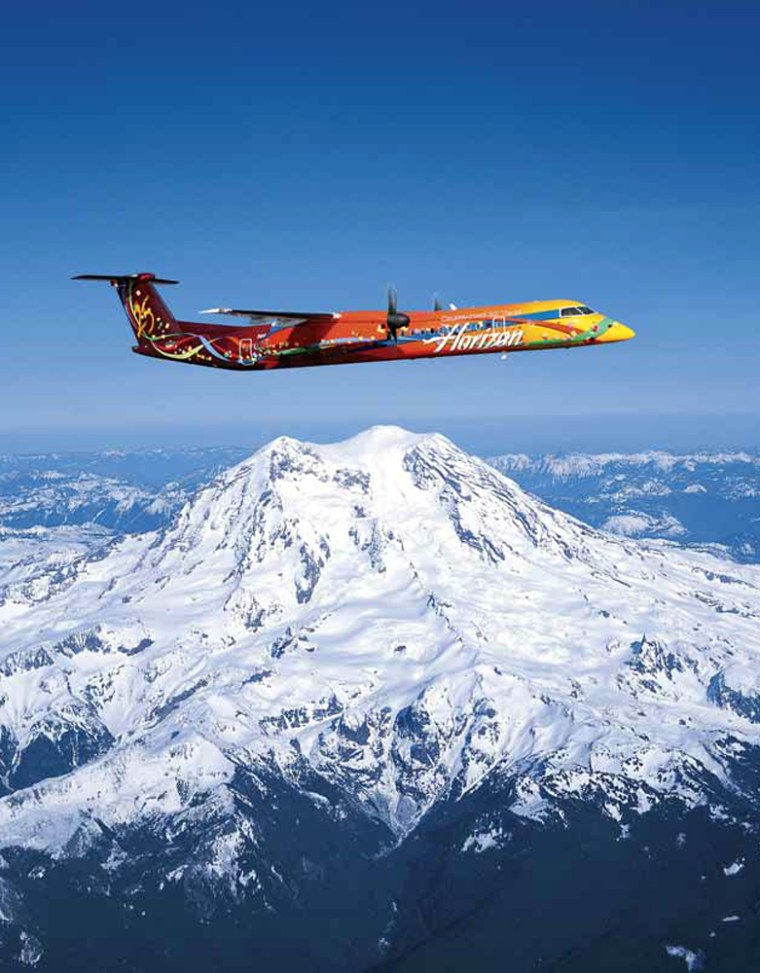Seattle-based Horizon Air could be forced to cancel as much as 25 percent of its entire flight schedule in coming days as a result of Canadian manufacturer Bombardier's urgent recommendation that airlines inspect their Q400 turboprops for landing-gear problems.
Most of the 33 Q400s that Horizon Air operates are affected by an All Operators Message (AOM) broadcast by Bombardier on Wednesday, asking airlines immediately to inspect the landing gear units of all Q400s that have operated more than 10,000 flights. Half of Horizon Air's entire flight schedule is flown by Q400s, Horizon Air spokeswoman Jen Boyer confirmed.
Bombardier sent the message to all 22 customers for the Q400 after Scandinavian Airlines (SAS) saw the right main landing-gear units of two of its 70-seat Q400s collapse upon landing in the space of three days. The urgent message "highly recommended" the inspections and was also broadcast by Goodrich, the company that makes the landing gear for the Q400.
Altogether, 19 of the 33 Q400s in Horizon Air's fleet are affected by the inspection request. Bombardier's request could soon be backed up by mandatory directives from the FAA and other leading airworthiness authorities around the world once the Canadian transport department Transport Canada has had chance to review Bombardier's initial findings from the two SAS incidents.
Horizon Air operates 481 flights a day and, of these, 241 flights — almost exactly half the airline's total schedule — are operated by Q400s, Boyer confirmed. The carrier, which is the sister regional airline of Alaska Airlines, has canceled 114 Q400 flights today.
At 1 p.m. PST, Horizon Air had yet to receive from Bombardier the specification detailing the actions required in the Q400 inspections. As a result, even though the airline had "mechanics standing by and everything lined up" for the inspections to go ahead, it had not yet begun specifically focused inspections of the landing gear of the 19 aircraft, said Boyer.
Accordingly, Horizon Air couldn’t confirm how much of its schedule would be affected in coming days by the need to inspect the 19 Q400s in its fleet that have operated more than 10,000 flights. Nor could the airline say how long each inspection might take. However, as much as 25 percent of Horizon Air's entire schedule "could be" canceled in the next few days, Boyer confirmed.
Bombardier is now writing the detailed inspection procedure for the affected Q400s and will transmit it to operators "as soon as possible, of course," said Bombardier spokesman Marc Duchesne. "In the meantime, we're asking operators to do routine inspections of the landing gear," he said.
Duchesne said the two SAS incidents weren't linked in any way to landing gear malfunction incidents in March involving two Bombardier Q-Series turboprop airliners, one of them a Q400 operated by All Nippon Airways and the other a 50-seat Q300 operated by another Japanese airline, Amakusa Airlines. Those incidents affected the nose landing gear units of the two aircraft, he said.
Horizon Air doesn’t expect to cancel any more Q400 flights today, said Boyer. The airline worked through the night to re-book most of its passengers on other Horizon Air flights, Alaska Airlines services (the two airlines overlap on some routes and destinations), and other airlines' flights. Some passengers received refunds, and Horizon Air was able to replace some lightly booked Q400 flights with services operated by 37-seat Bombardier Q200 turboprops.
Sister carrier Alaska Airlines provided "wonderful support" in agreeing to operate 13 additional flights with mainline jets on Horizon Air's behalf, said Boyer. All of Horizon Air's 20 Bombardier CRJ700 regional jets and 20 Q200 turboprops are still in service, as are 14 Q400s. None of the 20 Q200s need the detailed landing-gear inspections required for its Q400s, she confirmed.
Boyer told Aviation.com that Horizon Air took the decision to bring all its Q400s back to base as a precautionary measure before Bombardier sent out the AOM. The carrier started working to bring all its Q400s back to Seattle as soon as it received news of the second SAS incident, which happened at 1:36 a.m. local time at Vilnius Airport in Lithuania on Wednesday, or 4:36 p.m. local time on Tuesday, Sept. 11 in Seattle.
By 5:00 p.m. EST on Wednesday, Bombardier had identified 55 Q400s that required the detailed landing-gear inspection. However, some airlines, including Australia's Qantas, had not yet reported back to the manufacturer whether any of their aircraft met the 10,000-flight criterion that would trigger the need for the detailed inspection to take place.
SAS operates 23 of the 55 identified aircraft and Horizon Air 19. Of the remaining 13 aircraft, Lufthansa Regional's Augsburg Airways operates four, All Nippon Airways and Japan Air Commuter three between them, and UK low-fare airline Flybe six, said Duchesne.
